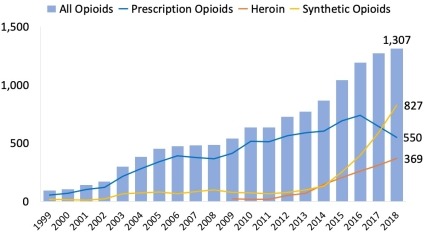

The Health Information Center is here to help! We offer a free health information service. We can send you information on the opioid epidemic or any other health topic. Please call us at 865-305-9525 or email us at library@utmck.edu.
Our hours:
Monday to Thursday--8:30 a.m. to 7:30 p.m.
Friday--8:30 a.m. to 5:00 p.m.
Saturday--9:00 a.m. to 2:00 p.m.
Sunday--12:00 p.m. to 6:00 p.m.
What are opioids?
Opioids are a type of drug that includes strong prescription pain relievers (MedlinePlus). A healthcare provider may have prescribed opioids for pain relief, but the use can lead to misuse and addiction.
What is opioid misuse and addiction?
According to MedlinePlus, misuse happens when you are not taking your prescription as told by your healthcare provider, you are taking someone else's opioids, or you are taking them to get high. MedlinePlus states that "an opioid addiction is a chronic brain disease. It causes a person to compulsively seek out drugs, despite the negative consequences."
For more information, see MedlinePlus.
What is the opioid epidemic?
The U.S. Department of Health and Human Services explains this in great detail. Below is a brief overview:
In the late 1990s, pharmaceutical companies reassured the medical community that patients would not become addicted to opioid pain relievers and healthcare providers began to prescribe them at greater rates.
Increased prescription of opioid medications led to widespread misuse of both prescription and non-prescription opioids before it became clear that these medications could indeed be highly addictive.
In 2017 HHS declared a public health emergency and announced a 5-Point Strategy To Combat the Opioid Crisis.
For more information, please see here.

Need treatment help? The Substance Abuse and Mental Health Services Administration can help you find treatment centers in your area. Click here to be taken to their map. Just type in your zip code and you'll get a list of results.
You can also search for state agencies by state. Click here and select your state to see a list.

About 2 million people live with an opioid addiction in the United States. Opioid addiction affects all people. It does not discriminate on socio-economic class, where you live, your age, or your gender.
Sources: MedlinePlus Magazine, National Institute on Drug Abuse, Substance Abuse and Mental Health Service Administration's National Helpline. January 2019.
If you or a loved one needs help with opioid misuse or other types of addiction, call the Substance Abuse and Mental Health Service Administration's National Helpline at 1-800-662-HELP (4357). It is free, confidential, and available 24/7, 365 days a year.

According to the National Institute on Drug Abuse, Tennessee's rate of death from opioid overdose is higher than the national average. In 2017, Tennessee had a rate of 19.3 deaths per 100,000 persons and the national average is 14.6 deaths per 100,000 persons. In 2018, drug overdose deaths involving opioids totaled 1,307 which is a rate of 19.9.

Figure 1. Number of overdose deaths involving opioids in Tennessee, by opioid category. Drug categories presented are not mutually exclusive, and deaths may have involved more than one substance. Source: CDC WONDER, 2020.

The National Institute on Drug Abuse states "Many people who are addicted to drugs are also diagnosed with other mental disorders, including anxiety and depression. Some people develop mental health problems related to their compulsive drug use, and some people take drugs in an attempt to alleviate symptoms of mental health disorders. Whatever symptoms appear first, it is important to treat all mental illnesses at the same time."
NIDA. (2019, May 11). Mental Health. Retrieved from https://www.drugabuse.gov/related-topics/mental-health on 2020, April 13
The National Institute on Drug Abuse has a helpful page full of resources related to mental health. The information can be found here.
SAMHSA has a ton of great information on mental health and addiction. See here to find anything from treatment information to topic pages.
Mental Health America also has information pages on substance abuse. Take a look here.
Having false beliefs about mental illness can lead to many problems. Stigma happens when someone views you in a negative way based on characteristic or personal trait. Stigma with mental illness is very common (Mayo Clinic).
Here are some ways you can deal with stigma:
For more detailed information, see this page by Mayo Clinic: Mental Health: Overcoming the Stigma of Mental Illness.

According to MedlinePlus, treatments for opioid misuse and addiction include:
MedlinePlus provides an information page with treatment information for opioid misuse and addiction. It discusses the different medicines, counseling, and residential and hospital-based treatments. See here.
This video from MedlinePlus and the National Library of Medicine will give you a good overview of Naloxone. For more information, see here.
MAT, or medication-assisted therapy, includes medicines, counseling, and behavioral therapies. This offers a "whole patient" approach to treatment. It can increase your chance of a successful recovery.
MedlinePlus, 2020.
For more information, see SAMHSA's information page on Medication and Counseling Treatment.
To find a treatment program, use this directory.
For more information on medicines, see the National Institute on Drug Abuse's page about medications that are used to treat opioid use disorder. Learn more here.